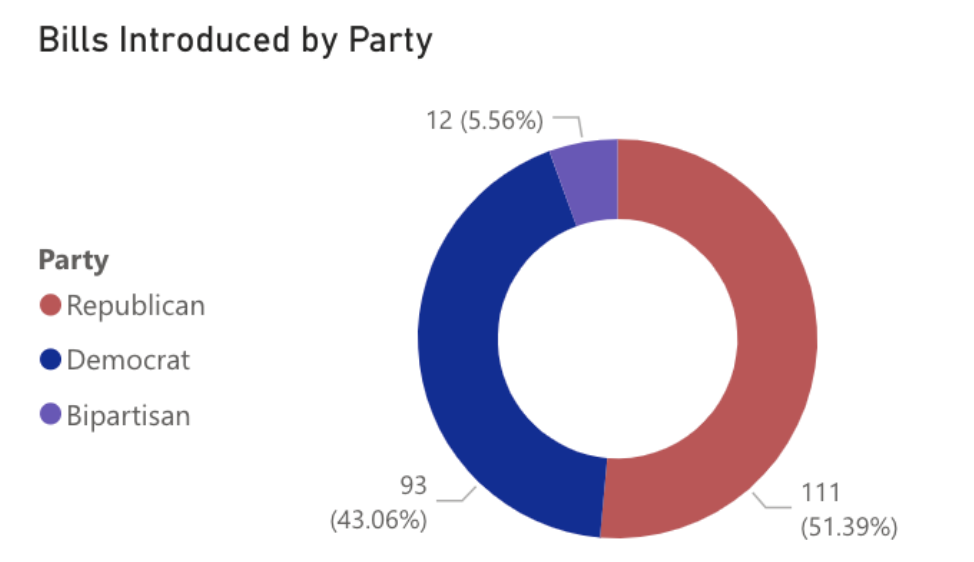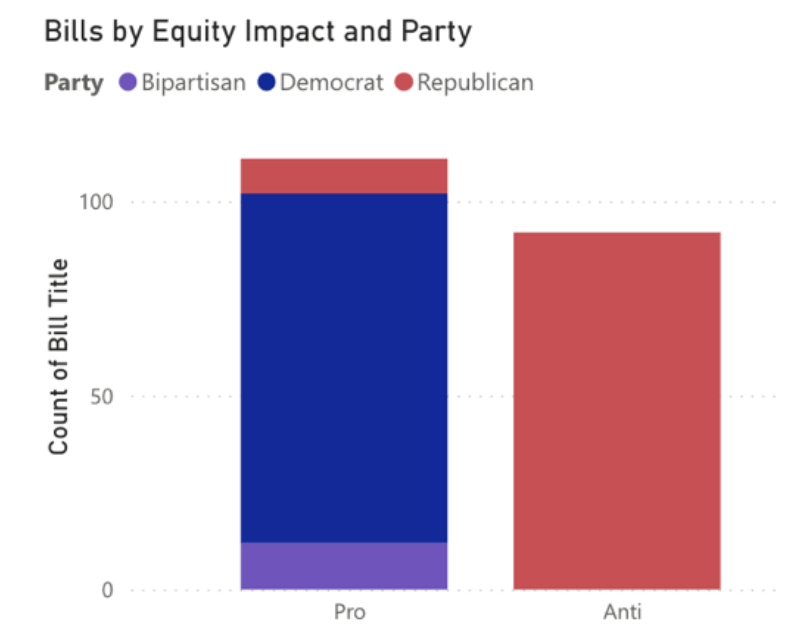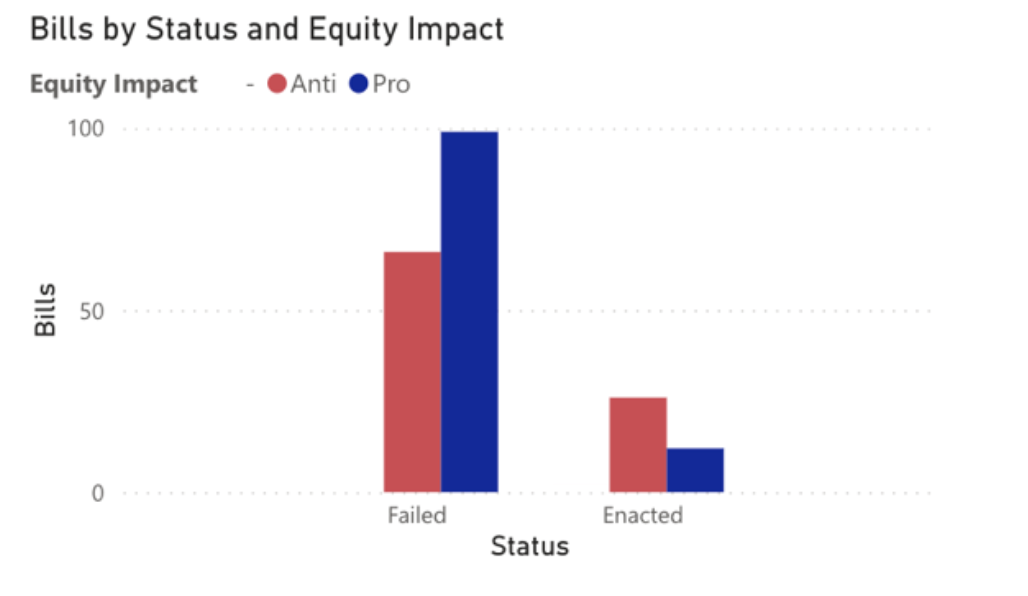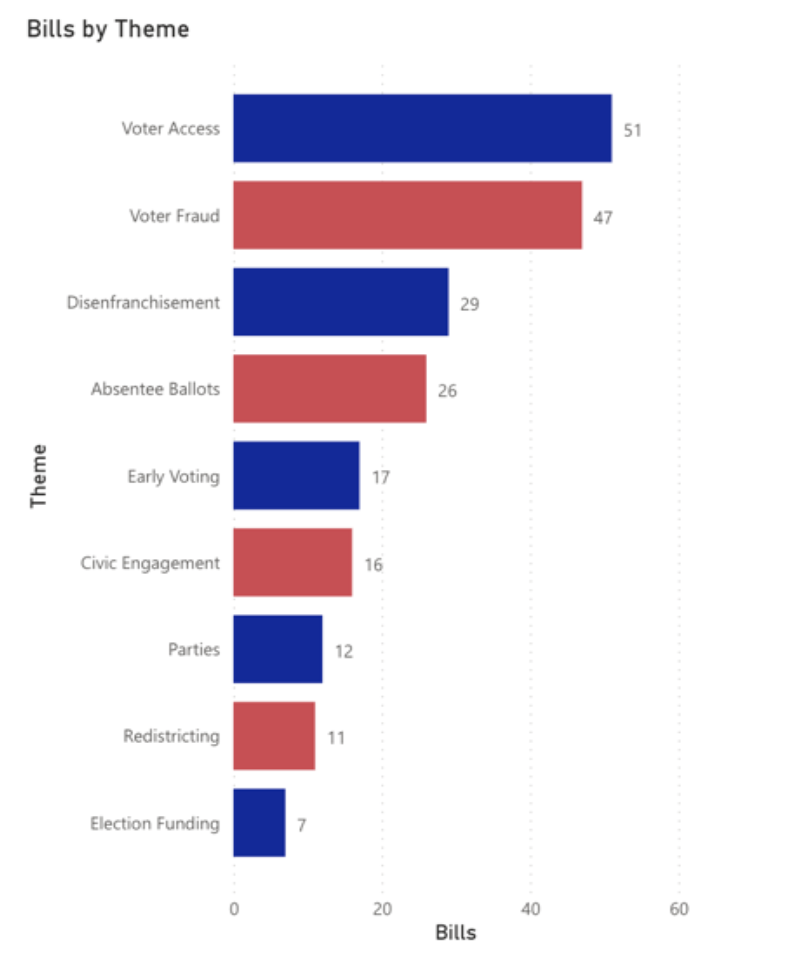Democracy & Voting
Voting is the cornerstone of our democracy. The fundamental right to vote guaranteed to most American citizens under the Constitution has been under attack across the country over the past several years. Preserving our democracy through equal and expanded access to voting rights in the South is crucial for several reasons.
Democracy relies on the principle of representation. When certain groups are denied equal access to voting rights, their voices are silenced, and their interests are not adequately represented in government. This can lead to policies that favor the majority at the expense of marginalized communities. As such, equal access to voting is a fundamental civil right. Denying this right disproportionately affects minority communities and can perpetuate historical injustices and discrimination. Protecting voting rights is a way to uphold civil rights and promote social equality.
Historically, the South has been a region with a legacy of voter suppressions, especially against African Americans. Today, though, we see this suppression spreading in states throughout the country as the nation continues to be divided by polarized politics. Preserving voting rights helps to prevent discrimination and ensures that everyone has an equal opportunity to participate in the democratic process. Likewise, a fair and accessible electoral system builds trust in the democratic process. Conversely, when people perceive that their voices are suppressed or their voices don’t matter, it erodes trust in democracy itself.
2023 has been an important year for democracy and voting rights in Southern legislatures. There were legislative efforts that both sought to further guarantee the right to vote by expanding access and others that attempted to reduce access to the vote in order to prevent the perceived threat of voter fraud, popularized after the 2020 election.
EPU tracked 216 voting rights bills across 13 Southern States during the 2023 legislative sessions. The South’s history of civil rights struggles and progress can serve as an example for the rest of the country and the world. By ensuring equal access to voting, the South can demonstrate its commitment to democratic values and social justice. Our review of the 2023 legislative measures related to democracy and voting indicate that there is still much work to be done.

Out of the 216 bills EPU tracked, 111, or about 51%, were sponsored by Republicans, 93, or about 43%, by Democrats, and 12, or about 6%, by a bipartisan group of legislators.
Of the bills proposed, 92 – or 42.6% of total bills – were measures that have the potential to negatively affect the advancement of equity related to democracy and voting. All of these bills were sponsored by Republican representatives. There were 90 bills sponsored by Democratic legislators, 12 bipartisan bills, and 9 bills sponsored by Republicans that were considered to have the ability to positively impact the advancement of equity, representing 51.4% of total bills. 13 bills, or around 6%, had an undetermined impact on equity.

Approximately 81% of the bills that were tracked related to democracy and voting were unsuccessful in being enacted into law. When the results are broken out by impact on equity, however, those with a negative impact on the advancement of equity had much greater success (12%), while only 5.6% of those with a positive impact on equity that we monitored were successfully enacted into law.

Accessing Absentee Ballots
Of the bills we monitored, there were 26 bills across nine states regarding absentee ballots. In Alabama and West Virginia, legislators sought to remove the requirement of providing an excuse to apply for an absentee ballot, while other states proposed measures that would allow college students to vote via mail. Other states proposed legislation in the opposite direction, seeking to add requirements to provide an excuse when requesting an absentee ballot where such requirements do not presently exist. Additionally, Mississippi sought to ban what legislators termed as “ballot harvesting” for absentee ballots, or methods for collecting these ballots that benefit rural, elderly, and disabled people. However, the law enacted through Mississippi Senate Bill 2358 was temporarily blocked by a U.S. district court in July, taking issue with the law’s “broad and vague nature.”

Measures to Prevent “Voter Fraud”
Perceptions of voter fraud have been fueled by a combination of factors, including partisan politics, changes in voting technology, and shifts in demographics. It’s important to distinguish between legitimate concerns about election integrity and unsubstantiated claims. Election officials, both at the state and federal levels, have consistently stated that voter fraud is relatively rare in the United States, and numerous studies have supported this assertion. However, the perception of voter fraud continues to be a contentious issue in American politics, including in Southern legislatures.
Of the bills we monitored, 11 out of 13 states introduced or passed bills attempting to reduce or eliminate the perceived threat of voter fraud that has grown increasingly popular in belief after both the 2016 and 2020 elections. In the 2016 election, then-candidate Donald Trump suggested, without evidence, that there was widespread voter fraud. After the 2020 election, false claims of widespread fraud were central to the political discourse, culminating in the storming of the U.S. Capitol on January 6, 2021.
45 of the bills that we tracked were filed by Republicans. Most of these bills include stricter requirements to register or requiring more documents to prove identity at the polls. Most troubling, however, is the criminalization of illegally voting in states like Florida, Mississippi, Arkansas, and Texas. Other bills sought to grant more power to the state in the oversight of federal elections. In Arkansas, House Bill 1513 created an Election Integrity Unit to be overseen by the State Attorney General with an executive director appointed by the Attorney General.
Arkansas House Bill 1416 – This voter fraud bill was enacted by the Arkansas legislature and grants power to the Secretary of State to review and report on Federal Election guidelines. Bills like this give credence to the “Big Lie” and empower proponents of the Independent State Legislature Theory to question the validity of Federal Elections. Other states must watch similar bills that have yet to pass such as Texas Senate Bill 398 or Mississippi Senate Bill 2351 to prevent them from passing in 2024.
Though unsuccessful in 2023, the Virginia bills detailed below were aimed at eliminating numerous mechanisms that make it easier to vote while implementing additional measures to make it even harder for some to engage in their civil right to do so. Considering the current political climate and an upcoming presidential election in 2024, it is very likely that there will be additional efforts in Virginia and other states to introduce similar measures in the 2024 legislative sessions.
- HB 1467 – This bill sought to mandate the use of photo identification for voting, with provisions for provisional ballots if voters lack the required ID. The bill also sought to limit in-person voter registration to specific groups, reduced the period for in-person absentee voting, set strict deadlines for returning absentee ballots by mail, eliminated drop-off locations, and required social security numbers on absentee ballot applications while making witness signatures on absentee ballots mandatory.
- HB 1847 – This bill sought to mandate various changes, including the removal of same-day voter registration and pre-registration for certain individuals under 18, the elimination of permanent absentee voter lists, and the requirement for an excuse to vote absentee. It also sought to reduce the timeframe for in-person absentee voting, and repeal provisions for allowing absentee ballot drop boxes. Additionally, it sought to enforce stricter voter ID requirements and specify new criteria for provisional ballots.
- HB 1812 – This bill sought to mandate the Attorney general to assess and report on foreign interference in elections, allowing for sanctions against foreign governments involved in such interference. It also included provisions for adjustments to voter registration deadlines, list maintenance activities, absentee voting requirements, and voter ID rules. Furthermore, it sought to eliminate curbside voting, same-day voter registration, and the use of internet-connected voting systems while increasing penalties for voter registration fraud to a Class 4 felony.
Bipartisan Efforts to Restore Voting Rights
Restoring voting rights for formerly incarcerated individuals is crucial for several reasons. First and foremost, it promotes the principles of democracy and civic engagement. When individuals who have served their sentences are allowed to vote, it acknowledges their reintegration into society and reaffirms their stake in the democratic process.
Moreover, disenfranchising formerly incarcerated people disproportionately affects minority communities, exacerbating existing inequalities in the criminal justice system. Restoring their voting rights helps address systemic disparities and promotes social justice.
Furthermore, it can reduce recidivism rates by encouraging individuals to become more engaged in their communities and have a say in policies that affect their lives, making them more invested in lawful and productive behavior. Overall, restoring voting rights to formerly incarcerated individuals is a step toward a more inclusive and equitable democracy.
The following bills were bipartisan efforts to expand the franchise to formerly incarcerated individuals. Though unsuccessful, they both serve as excellent examples of legislation for others to model and continue to press through to ensure the restoration of full rights to those who have been involved in the justice system.
- West Virginia HB 3009 – This bill sought to automatically restore a person’s right to vote upon their release from incarceration, whether or not the person is on probation, parole, or supervised release.
- South Carolina House Bill 4221 – This bill would have allowed people on parole to register to vote and would have allowed currently-incarcerated people to vote upon completion of a civics course.
Wins for Equity
Virginia House Bill 1948 – This bill was a Bipartisan effort and removes the witness requirement for absentee ballots and replaces it with the requirement that the voter provide the last four digits of their social security number and his birth year.
- Why it’s important: Removing restrictive requirements on absentee voting is essential to ensure the inclusivity and accessibility of the democratic process in the United States. Restrictive requirements can disproportionately impact vulnerable populations, making it difficult for citizens, particularly those with mobility challenges or who reside in remote areas, to exercise their right to vote. Streamlining absentee voting procedures promotes greater civic engagement and voter turnout as it allows individuals to participate in the electoral process without facing unnecessary hurdles.
Tennessee Senate Bill 346 – This Bipartisan effort now requires high school students to be informed that they can register to vote upon turning 18. The bill also requires the Secretary of State to provide information to these students on how to register, increasing the opportunity for informed civic engagement for young people across Tennessee.
- Why it’s important: Educating young adults about their voting rights fosters civic engagement and encourages them to actively participate in the democratic process. Knowledge of these rights also empowers them to take control of their political voice and influence, and helps to develop the habit of voting at an early age which is more likely to lead to continued civic participation throughout adulthood. A well-informed, diverse electorate is essential for a representative democracy.
2024 Outlook
It is no secret that there has been a continued erosion of the thread of our American democracy and the voting rights of its citizens. While this assertion may initially appear hyperbolic, it stands as an undeniable reality. Although it may strike some as absurd, we must underscore the seriousness of the situation. Over the course of decades, several factors have ignited a crisis that now threatens the very foundations of our democracy that has now been exacerbated by attempts to undermine the legitimacy of elections across the country. Coupled with harmful ideologies that have now permeated through not only the halls of the legislative branch but also to the judiciary, potentially conferring state legislatures the unbridled authority over federal elections, irrespective of voter preferences.
Notwithstanding this somber outlook, it is essential to emphasize that there are still paths that offer hope, and those paths lie with our state governance. By addressing unchecked dominance, irrespective of political affiliation, we can establish safeguards for our democratic institutions. This approach is instrumental in preventing any attempt to subvert the democratic process and hinder the right of people to have a say in who and how they are governed.
